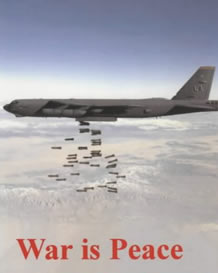| War is Peace | 2003-11-04 11:03 5 comments |
 by Flemming Funch by Flemming FunchA few Orwellian words about war from "1984": "The war, therefore, if we judge it by the standards of previous wars, is merely an imposture. It is like the battles between certain ruminant animals whose horns are set at such an angle that they are incapable of hurting one another. But though it is unreal it is not meaningless. It eats up the surplus of consumable goods, and it helps to preserve the special mental atmosphere that a hierarchical society needs. War, it will be seen, is now a purely internal affair. In the past, the ruling groups of all countries, although they might recognize their common interest and therefore limit the destructiveness of war, did fight against one another, and the victor always plundered the vanquished. In our own day they are not fighting against one another at all. The war is waged by each ruling group against its own subjects, and the object of the war is not to make or prevent conquests of territory, but to keep the structure of society intact. The very word "war," therefore, has become misleading. It would probably be accurate to say that by becoming continuous war has ceased to exist. The peculiar pressure that it exerted on human beings between the Neolithic Age and the early twentieth century has disappeared and has been replaced by something quite different. The effect would be much the same if the three superstates, instead of fighting one another, should agree to live in perpetual peace, each inviolate within its own boundaries. For in that case each would still be a self-contained universe, freed forever from the sobering influence of external danger. A peace that was truly permanent would be the same as a permanent war. This -- although the vast majority of Party members understand it only in a shallower sense -- is the inner meaning of the Party slogan: WAR IS PEACE."George Orwell [1903-1950], whose birth name was Eric Blair, was an intense novelist and political essayist; a socialist, he fought in the Loyalist forces in the Spanish Civil War, and was a critic of totalitarianism, including Stalinism. He also foresaw the rise of our present post-post-modern bureaucratic authoritarianism. |